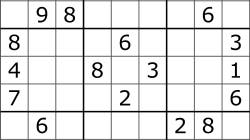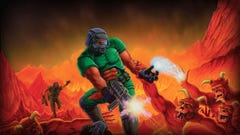Cryptics, Sudoku and authorship
A house divided.
I have misplaced the book - I can at least tell you it's called Two Girls, One on Each Knee and it's by Alan Connor and it's wonderful - but I remember reading that a newspaper (I think the Telegraph) at one point (I think it was the 1990s) tried to meddle with the way Cryptic crosswords got made.
Crucially, they tried to meddle with the authorship. Real humans would still set the individual clues, but then computers would step in and build the clues into complete puzzle grids. If you're not into Cryptics, you're probably like: so what? But people who were into Cryptics were very much not: so what. They were very much: what.
Cryptic crosswords are the crosswords that have the really confusing clues. Here's a favourite. You, 500 (4). That four means the answer has four letters in it. The other bit is the clue, which with a good Cryptic such as this one should contain a literal definition of the answer and also a bit of wordplay designed to help you to the answer. You solve Cryptics in kind of a pincer movement. I actually solved You, 500 (4) myself when I first saw it (well, after about twenty minutes of getting grumpy), and it was one of the highlights of my life. The answer is "thou". "You" literally means thou. And "500" is half of a thousand, just as half of a thousand is also...thou.
Anyway, I hope that proves that Cryptics are very heavily authored at the clue level. You get to know setters. For a while I used to do Rufus' puzzle in the Guardian on a Monday. Rufus was always very kind - I think You, 500 (4) was one of his but maybe not. His entire puzzle grid would still take me all day to do, and I think you're meant to do them in an hour, but he felt more approachable. (Also over the course of that day I often had to cheat a bit.)
But Cryptics are also authored on a deeper level. Sometimes the whole grid has a story or a gimmick or a theme. This is most brilliantly illustrated by The Listener Crossword, which I also read about in Connor's book - did I mention it's wonderful? - but the Listener is a rabbit hole that you need an afternoon to fall down. Instead, and it's not actually a Cryptic, look at the New York Times Mini, a crossword that appears each day set by Joel Fagliano.
Fagliano is the subject of a sort of cult in our office. We have a Slack channel devoted to him and every day we view his work with trepidation and delight. When he's being mean, we post lengthy solving times and complain about Americanisms. When he's being nice there is nobody we love more than Joel Fagliano. Best of all is when a Fagliano crossword will have a theme, though. This means that all of the answers sort of line up in an interesting way. One time it was measurements - I think. Another time Fagliano gave us an awful lot of X words. Either way, we play the game and I think we all have our personal relationships with Fagliano. And that's because crosswords are authored at the clue level and the grid level. They are constructed with intent, they are gifts from the setter's mind to ours.
Right. So when the Telegraph tried to change all that, people were furious. And after a while the Telegraph caved. I think Boris Johnson who was at the Telegraph at the time had to apologise, and I think a setter shortly afterwards authored a Cryptic with the theme that the Telegraph could do one. But I might be wrong.
I thought of this last week when I suddenly realised that I had something to say about that incredible video of the guy solving the implausibly hard Sudoku puzzle that did the rounds a while back. You don't need to know how to play Sudoku to watch this 30 minute video of a man sitting in a chair and find it utterly gripping. The long and the short of it is Sudoku doesn't generally give you only a couple of numbers to start you on your way to filling the grid. This one does. The guy trying to solve it initially thinks it's a joke. Then he starts to tease away at the specific rules that come with the puzzle. Then he gets really excited that it might be possible. It's a dazzling thing to watch. You're watching someone's (extremely high-functioning) mind working. I love it.
Two things about this. One of them is that I had never really realised puzzles and the people who solve them are a bit like those chemicals that need to be stored separately or they explode. That's really what this video is about. The puzzle and the solver sort of react together, like magnesium going into a Bunsen flame. It feels like a chemical thing, like a chain reaction. (Wait. Is that chemistry or physics? Remember I'm the one who needs all afternoon to do a Rufus crossword.)
The second thing is: look at what authorship can do. This isn't strictly a standard Sudoku - it has special rules. But it makes me wonder whether there is authorship in the Sudoku world, and if the really great Sudokus set by the really great setters speak the language of numbers to their solvers in the way that the great Cryptics speak the language of words to theirs. Not just words! Sometimes all sorts of things. Chemistry! Physics! Sherlock Holmes! (Do check out The Listener! Or just google "Godly Mixup".)
For a while I had it in my head that all Sudokus were set by people. I imagined people who were very quiet and precise, inevitably, people who knew where their pens were and where they had put their keys, working in an environment that looked like Jonty Ives might have done the tiling. Then I decided that I was probably being romantic and that all Sudoku were set by computers. Number begat numbers etc. Now I wonder - I wonder how much the difference matters, and if there is richness out there, puzzley richness that I will never be able to actually understand, but which I can at least enjoy from a safe distance.








